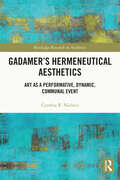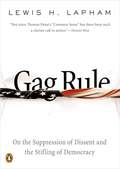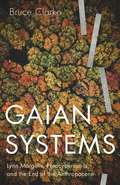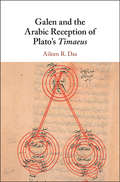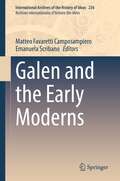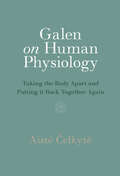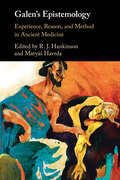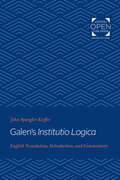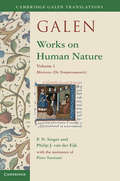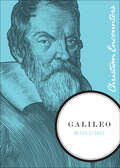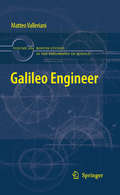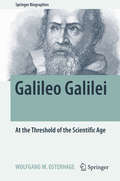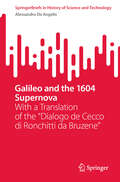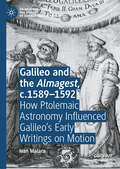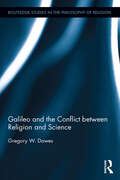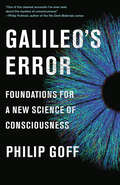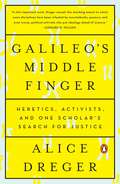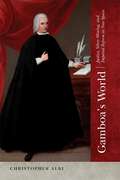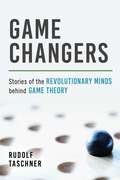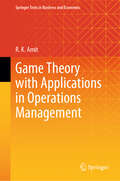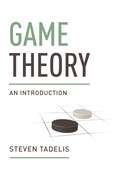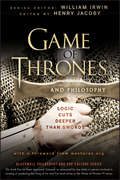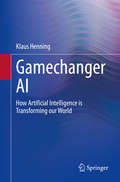- Table View
- List View
Gadamer’s Hermeneutical Aesthetics: Art as a Performative, Dynamic, Communal Event (Routledge Research in Aesthetics)
by Cynthia R. NielsenThis book offers a sustained scholarly analysis of Gadamer’s reflections on art and our experience of art. It examines fundamental themes in Gadamer’s hermeneutical aesthetics such as play, festival, symbol, contemporaneity, enactment, art’s performative ontology, and hermeneutical identity. The first two chapters focus on Gadamer’s critical appropriation and movement beyond Kantian and Hegelian aesthetics (and includes a coda on Heidegger’s influence). The final three chapters argue for the continued relevance of Gadamer’s hermeneutical aesthetics by bringing his claims into conversation with contemporary art and music, as well as the ethical and sociopolitical dimensions of the Artworld and art-praxis. The ethical and sociopolitical aspects of art- and music-making are given particular attention in chapters devoted to 20th century African American artist Romare Bearden, Banksy’s street art, and a range of jazz expressions, from traditional jazz to the complex practice of free jazz. Gadamer’s Hermeneutical Aesthetics will appeal to researchers and advanced students working on Gadamer, philosophical hermeneutics, continental philosophy, aesthetics, and the philosophy of contemporary art and music.
Gag Rule: On the Suppression of Dissent and the Stifling of Democracy
by Lewis LaphamLapham issues a call to action in defense of one of our most important liberties--the right to raise our voices against the powers that be and have those voices heard.
Gaian Systems: Lynn Margulis, Neocybernetics, and the End of the Anthropocene (Posthumanities #60)
by Bruce ClarkeA groundbreaking look at Gaia theory&’s intersections with neocybernetic systems theory Often seen as an outlier in science, Gaia has run a long and varied course since its formulation in the 1970s by atmospheric chemist James Lovelock and microbiologist Lynn Margulis. Gaian Systems is a pioneering exploration of the dynamic and complex evolution of Gaia&’s many variants, with special attention to Margulis&’s foundational role in these developments.Bruce Clarke assesses the different dialects of systems theory brought to bear on Gaia discourse. Focusing in particular on Margulis&’s work—including multiple pieces of her unpublished Gaia correspondence—he shows how her research and that of Lovelock was concurrent and conceptually parallel with the new discourse of self-referential systems that emerged within neocybernetic systems theory. The recent Gaia writings of Donna Haraway, Isabelle Stengers, and Bruno Latour contest its cybernetic status. Clarke engages Latour on the issue of Gaia&’s systems description and extends his own systems-theoretical synthesis under what he terms &“metabiotic Gaia.&” This study illuminates current issues in neighboring theoretical conversations—from biopolitics and the immunitary paradigm to NASA astrobiology and the Anthropocene. Along the way, he points to science fiction as a vehicle of Gaian thought. Delving into many issues not previously treated in accounts of Gaia, Gaian Systems describes the history of a theory that has the potential to help us survive an environmental crisis of our own making.
Galen and the Arabic Reception of Plato's Timaeus
by Aileen R. DasThis first full-length study of the Arabic reception of Plato's Timaeus considers the role of Galen of Pergamum (129–c. 216 CE) in shaping medieval perceptions of the text as transgressing disciplinary norms. It argues that Galen appealed to the entangled cosmological scheme of the dialogue, where different relations connect the body, soul, and cosmos, to expand the boundaries of medicine in his pursuit for epistemic authority – the right to define and explain natural reality. Aileen Das situates Galen's work on disciplinary boundaries in the context of medicine's ancient rivalry with philosophy, whose professionals were long seen as superior knowers of the cosmos vis-à-vis doctors. Her case studies show how Galen and four of the most important Christian, Muslim, and Jewish thinkers in the Arabic Middle Ages creatively interpreted key doctrines from the Timaeus to reimagine medicine and philosophy as well as their own intellectual identities.
Galen and the Early Moderns (International Archives of the History of Ideas Archives internationales d'histoire des idées #236)
by Matteo Favaretti Camposampiero Emanuela ScribanoThis book explores the presence of Galen of Pergamon (129 – c. 216 AD) in early modern philosophy, science, and medicine. After a short revival due to the humanistic rediscovery of his works, the influence of the great ancient physician on Western thought seemed to decline rapidly as new discoveries made his anatomy, physiology, and therapeutics more and more obsolete. In fact, even though Galenism was gradually dismissed as a system, several of his ideas spread through the modern world and left their mark on natural philosophy, rational theology, teleology, physiology, biology, botany, and the philosophy of medicine. Without Galen, none of these modern disciplines would have been the same. Linking Renaissance with the Enlightenment, the eleven chapters of this book offer a unique and detailed survey of both scientific and philosophical Galenisms from the sixteenth to the late eighteenth century. Figures discussed include Julius Caesar Scaliger, Giambattista Da Monte, Hyeronimus Fabricius ab Aquapendente, Andrea Cesalpino, Thomas Browne, Kenelm Digby, Henry More, Ralph Cudworth, Robert Boyle, John Locke, Guillaume Lamy, Jean-Baptiste Verduc, Gottfried Wilhelm Leibniz, Christian Wolff, Julien Offray de La Mettrie, Denis Diderot, and Kurt Sprengel.
Galen and the World of Knowledge
by Christopher Gill Tim Whitmarsh John WilkinsGalen is the most important medical writer in Graeco-Roman antiquity, and also extremely valuable for understanding Graeco-Roman thought and society in the second century AD. This volume of new essays locates him firmly in the intellectual life of his period, and thus aims to make better sense of the medical and philosophical 'world of knowledge' that he tries to create. How did Galen present himself as a reader and an author in comparison with other intellectuals of his day? Above all, how did he fashion himself as a medical practitioner, and how does that self-fashioning relate to the performance culture of second-century Rome? Did he see medicine as taking over some of the traditional roles of philosophy? These and other questions are freshly addressed by leading international experts on Galen and the intellectual life of the period, in a stimulating collection that combines learning with accessibility.
Galen on Human Physiology: Taking the Body Apart and Putting it Back Together Again
by Aistė ČelkytėGalen of Pergamum, known as 'the prince of medicine', is an important figure not only for the history of medicine but also for ancient philosophy, history of ideas and cultural history. In this book, Aistė Čelkytė explores Galenic physiology and examines how this highly influential figure theorised the unity of the multi-part, ever-moving and ever-changing human body. She approaches this question by first studying how Galen 'takes the body apart', that is, the different divisions of the body into parts that he proposes, and then how he 'puts it back together', that is, his use of philosophical tools to posit the vital unity among these parts. She then looks at Galen's theorisation of human nature, his understanding of parthood, the hierarchies between the parts that underpin vital functions, the 'mechanisms' that make the body one, and Galen's understanding of the body as a multifaceted but unified whole.
Galen's Epistemology: Experience, Reason, and Method in Ancient Medicine
by R. J. Hankinson Matyáš HavrdaDetermining what has gone wrong in a malfunctioning body and proposing an effective treatment requires expertise. Since antiquity, philosophers and doctors have wondered what sort of knowledge this expertise involves, and whether and how it can warrant its conclusions. Few people were as qualified to deal with these questions as Galen of Pergamum (129–ca. 216). A practising doctor with a keen interest in logic and natural science, he devoted much of his enormous literary output to the task of putting medicine on firm methodological grounds. At the same time he reflected on philosophical issues entailed by this project, such as the nature of experience, its relation to reason, the criteria of truth, and the methods of justification. This volume explores Galen's contributions to (mainly scientific) epistemology, as they arise in the specific inquiries and polemics of his works, as well as their legacy in the Islamic world.
Galen's Institutio Logica: English Translation, Introduction, and Commentary
by John Spangler KiefferOriginally published in 1964. This book is a translation of Institutio Logica, which was probably written by Galen, although scholars disagree on the possibility of this work being a forgery. It provides a survey on the history of logic written around the third century.
Galen: Volume 1, Mixtures (Cambridge Galen Translations)
by Dr P. N. Singer Professor Philip J. van der Eijk Professor Piero TassinariMixtures is of central importance for Galen's views on the human body. It presents his influential typology of the human organism according to nine mixtures (or 'temperaments') of hot, cold, dry and wet. It also develops Galen's ideal of the 'well-tempered' person, whose perfect balance ensures excellent performance both physically and psychologically. Mixtures teaches the aspiring doctor how to assess the patient's mixture by training one's sense of touch and by a sophisticated use of diagnostic indicators. It presents a therapeutic regime based on the interaction between foods, drinks, drugs and the body's mixture. Mixtures is a work of natural philosophy as well as medicine. It acknowledges Aristotle's profound influence whilst engaging with Hippocratic ideas on health and nutrition, and with Stoic, Pneumatist and Peripatetic physics. It appears here in a new translation, with generous annotation, introduction and glossaries elucidating the argument and setting the work in its intellectual context.
Galileo (Christian Encounters)
by Mitch StokesWe learn about life through the lives of others. Their experiences, their trials, their adventures become our schools, our chapels, our playgrounds. Christian Encounters, a series of biographies from Thomas Nelson Publishers, highlights important lives from all ages and areas of the Church through prose as accessible and concise as it is personal and engaging. Some are familiar faces. Others are unexpected guests. Whether the person is Galileo, William F. Buckley, John Bunyan, or Isaac Newton, we are now living in the world that they created and understand both it and ourselves better in the light of their lives. Their relationships, struggles, prayers, and desires uniquely illuminate our shared experience.HERO OR HERETIC? GENIUS OR BLASPHEMER?It's no mystery how profound a role Galileo played in the Scientific Revolution. Less explored is the Italian innovator's sincere, guiding faith in God. In this exhaustively researched biography that reads like a page-turning novel, Mitch Stokes draws on his expertise in philosophy, logic, math, and science to attune modern ears with Galileo's controversial genius.Emerging from the same Florentine milieu that produced Dante, da Vinci, Machiavelli, Michelangelo, Amerigo Vespuci, Galileo questioned with a persistence that spurred his world toward an unabating era of discovery. Stokes confronts the myth that Galileo's stance on heliocentricity stood astride a church vs. science divide and explores his calculations for the dimensions of Dante's hell, his understanding of motion, and his invention of the pendulum clock.To read this volume is to journey through Galileo's remarkable life: from his inquisitive childhood to his dying days, when, although blind and decrepit, he soldiered on, dictating mathematical thoughts and mentoring young proteges.
Galileo Engineer
by Matteo VallerianiThis work systematically investigates and reconstructs the practical knowledge Galileo shared during his lifetime. Galileo shared many aspects of practical knowledge. These included the methods and experience of foremen and engineers active within various frameworks. Galileo did not always react to such scientific impulses in the same way. On the one hand, he not only shared practical knowledge, but also acted as an engineer, especially within the framework of the art of war at the end of the sixteenth century, and more so during the time he spent in Padua. On the other hand, his scientific achievements were largely based on and influenced by aspects of practical knowledge coming from particular disciplines and activities, without him ever becoming an expert in these disciplines. Two case studies, the first concerned with Galileo's theory of the strength of materials and the second with his achievement of an atomistic heat doctrine, enable a focus on the early modern model of generation of new scientific knowledge based on the conflicting interaction between aspects of practical knowledge and Aristotelian theoretical assumptions.
Galileo Galilei: At the Threshold of the Scientific Age (Springer Biographies)
by Wolfgang W. OsterhageThis new scientific biography explores the influences on, and of, Galileo’s exceptional work, thereby revealing novel connections with the worldviews of his age and beyond.Galileo Galilei's contribution to science is unquestionable. And his conflict with the church establishment of his time is no less famous. In this book, authored by a physicist and history scholar, Galileo's life and work are described against a backdrop of the prior scientific state of the art in his various fields of achievement. Particular emphasis is placed on Galileo's vision of the world in relation to historic and also future cosmological models. The impact of his discoveries and theories for the later development of physics and astronomy is a further focus of the narrative.
Galileo and the 1604 Supernova: With a Translation of the "Dialogo de Cecco di Ronchitti da Bruzene" (SpringerBriefs in History of Science and Technology)
by Alessandro De AngelisThis book is about the 1604 supernova and presents the translation of key documents discussing this astronomical event in Italy. Only seven Galactic supernovae visible to the naked eye are documented, with the 1604 event, the last in history, profoundly impacting astronomy, cosmology, and culture in general. The 1604 supernova challenged the prevailing belief in the unchanging nature of stars. Astronomers like Galileo and Kepler, alongside counterparts from Arab, Chinese, and Korean backgrounds, collaborated to explain its origin, analyzing astronomical and astrological signals five years before the invention of the telescope. Galileo, approached for interpretation while teaching in Padua, cautiously expressed his views in three unpublished lectures, a pseudonymous treatise written in Paduan dialect, and a poem immediately withdrawn, sparking a dispute with Aristotelian scholars in Italy. The 1604 supernova, a pivotal historical event, spurred collaborative efforts and debates, reshaping perceptions of the cosmos. This debate dominated science from 1604 to 1606, preceding Kepler's treatise {\em De Stella Nova}. Remnants of the explosion of the supernova, called today Kepler’s supernova, are still visible and are the subject of studies by modern observatories and discussions in the astrophysical community.
Galileo and the Almagest, c.1589–1592: How Ptolemaic Astronomy Influenced Galileo’s Early Writings on Motion (Palgrave Studies in the History of Science and Technology)
by Ivan MalaraThis book offers a groundbreaking exploration of Galileo Galilei’s engagement with the Almagest, Claudius Ptolemy’s second-century scientific work on the motions of stars and planetary paths. Contrary to the belief that Galileo had little interest in Ptolemaic astronomy, the author investigates whether Ptolemy influenced Galileo’s shift to Copernicanism, the theory that Earth and all other planets revolve around the Sun. This inquiry is pursued through a detailed examination of Galileo’s early writings on motion, namely the so-called De motu antiquiora (c. 1589–1592). By contextualizing Galileo’s initial reception of Ptolemy, the book reveals a fascinating historical backdrop, highlighting how the Almagest was intended to be read and studied in Galileo’s milieu during the last decades of the sixteenth century. The author challenges the conventional ‘Ptolemaic-Aristotelian’ label by showing that early Galileo adhered to a Ptolemaic, yet non-Aristotelian, cosmology supported by an Archimedean-like rationale. Additionally, the book underscores the often-overlooked impact of Theon of Alexandria’s commentary on the Almagest in the sixteenth- and seventeenth-century reception of Ptolemy, suggesting it as one of Galileo’s potential sources. Offering valuable insights for historians of science and early modern astronomy, this book illuminates Galileo’s intricate relationship with astronomical and philosophical ideas, emphasizing the need to re-examine his intellectual journey within a nuanced historical framework.
Galileo and the Conflict between Religion and Science (Routledge Studies in the Philosophy of Religion)
by Gregory W. DawesFor more than 30 years, historians have rejected what they call the ‘warfare thesis’ – the idea that there is an inevitable conflict between religion and science – insisting that scientists and believers can live in harmony. This book disagrees. Taking as its starting point the most famous of all such conflicts, the Galileo affair, it argues that religious and scientific communities exhibit very different attitudes to knowledge. Scripturally based religions not only claim a source of knowledge distinct from human reason. They are also bound by tradition, insist upon the certainty of their beliefs, and are resistant to radical criticism in ways in which the sciences are not. If traditionally minded believers perceive a clash between what their faith tells them and the findings of modern science, they may well do what the Church authorities did in Galileo’s time. They may attempt to close down the science, insisting that the authority of God’s word trumps that of any ‘merely human’ knowledge. Those of us who value science must take care to ensure this does not happen.
Galileo's Error: Foundations for a New Science of Consciousness
by Philip GoffFrom a leading philosopher of the mind comes this lucid, provocative argument that offers a radically new picture of human consciousness—panpsychism.Understanding how brains produce consciousness is one of the great scientific challenges of our age. Some philosophers argue that consciousness is something "extra," beyond the physical workings of the brain. Others think that if we persist in our standard scientific methods, our questions about consciousness will eventually be answered. And some even suggest that the mystery is so deep, it will never be solved. Decades have been spent trying to explain consciousness from within our current scientific paradigm, but little progress has been made.Now, Philip Goff offers an exciting alternative that could pave the way forward. Rooted in an analysis of the philosophical underpinnings of modern science and based on the early twentieth-century work of Arthur Eddington and Bertrand Russell, Goff makes the case for panpsychism, a theory which posits that consciousness is not confined to biological entities but is a fundamental feature of all physical matter—from subatomic particles to the human brain. In Galileo's Error, he has provided the first step on a new path to the final theory of human consciousness.
Galileo's Middle Finger
by Alice DregerJared Diamond, author of Guns, Germs, and Steel and The World until Yesterday"Alice Dreger would win a prize for this year's most gripping novel, except for one thing: her stories are true, and this isn't a novel. Instead, it's an exciting account of complicated good guys and bad guys, and the pursuit of justice."An impassioned defense of intellectual freedom and a clarion call to intellectual responsibility, Galileo's Middle Finger is one American's eye-opening story of life in the trenches of scientific controversy. For two decades, historian Alice Dreger has led a life of extraordinary engagement, combining activist service to victims of unethical medical research with defense of scientists whose work has outraged identity politics activists. With spirit and wit, Dreger offers in Galileo's Middle Finger an unforgettable vision of the importance of rigorous truth seeking in today's America, where both the free press and free scholarly inquiry struggle under dire economic and political threats.This illuminating chronicle begins with Dreger's own research into the treatment of people born intersex (once called hermaphrodites). Realization of the shocking surgical and ethical abuses conducted in the name of "normalizing" intersex children's gender identities moved Dreger to become an internationally recognized patient rights' activist. But even as the intersex rights movement succeeded, Dreger began to realize how some fellow progressive activists were employing lies and personal attacks to silence scientists whose data revealed uncomfortable truths about humans. In researching one such case, Dreger suddenly became the target of just these kinds of attacks.Troubled, she decided to try to understand more--to travel the country to ferret out the truth behind various controversies, to obtain a global view of the nature and costs of these battles. Galileo's Middle Finger describes Dreger's long and harrowing journeys between the two camps for which she felt equal empathy: social justice activists determined to win and researchers determined to put hard truths before comfort. Ultimately what emerges is a lesson about the intertwining of justice and of truth--and a lesson of the importance of responsible scholars and journalists to our fragile democracy.Booklist (starred review)"A crusader in the mold of muckrackers from a century ago, Dreger doesn't try to hide her politics or her agenda. Instead she advocates for change intelligently and passionately. Highly recommended."Kirkus (starred review): "Let us be grateful that there are writers like Dreger who have the wits and the guts to fight for truth." Dan Savage, founder of "It Gets Better" Project; author of American Savage: "If there ever there were a book that showed how democracy requires smart activism and solid data--and how that kind of work can be defeated by moneyed interests, conservative agendas, inept governments, and duplicitous "activists"--this is it. Galileo's Middle Finger reads like a thriller. The cliché applies: I literally couldn't put it down. Alice Dreger leaves you wondering what's going to happen to America if our universities continue to turn into corporate brands afraid of daring research and unpopular ideas about who we are."
Galileo's Middle Finger: Heretics, Activists, and the Search for Justice in Science
by Alice DregerNew York Times Book Review "[S]mart, delightful... a splendidly entertaining education in ethics, activism and science."Editors's Choice, New York Times Book ReviewAn impassioned defense of intellectual freedom and a clarion call to intellectual responsibility, Galileo's Middle Finger is one American's eye-opening story of life in the trenches of scientific controversy. For two decades, historian Alice Dreger has led a life of extraordinary engagement, combining activist service to victims of unethical medical research with defense of scientists whose work has outraged identity politics activists. With spirit and wit, Dreger offers in Galileo's Middle Finger an unforgettable vision of the importance of rigorous truth seeking in today's America, where both the free press and free scholarly inquiry struggle under dire economic and political threats.This illuminating chronicle begins with Dreger's own research into the treatment of people born intersex (once called hermaphrodites). Realization of the shocking surgical and ethical abuses conducted in the name of "normalizing" intersex children's gender identities moved Dreger to become an internationally recognized patient rights' activist. But even as the intersex rights movement succeeded, Dreger began to realize how some fellow progressive activists were employing lies and personal attacks to silence scientists whose data revealed uncomfortable truths about humans. In researching one such case, Dreger suddenly became the target of just these kinds of attacks.Troubled, she decided to try to understand more--to travel the country to ferret out the truth behind various controversies, to obtain a global view of the nature and costs of these battles. Galileo's Middle Finger describes Dreger's long and harrowing journeys between the two camps for which she felt equal empathy: social justice activists determined to win and researchers determined to put hard truths before comfort. Ultimately what emerges is a lesson about the intertwining of justice and of truth--and a lesson of the importance of responsible scholars and journalists to our fragile democracy.Booklist (starred review)"A crusader in the mold of muckrackers from a century ago, Dreger doesn't try to hide her politics or her agenda. Instead she advocates for change intelligently and passionately. Highly recommended."Kirkus (starred review): "Let us be grateful that there are writers like Dreger who have the wits and the guts to fight for truth." Jared Diamond, author of Guns, Germs, and Steel and The World until Yesterday"Alice Dreger would win a prize for this year's most gripping novel, except for one thing: her stories are true, and this isn't a novel. Instead, it's an exciting account of complicated good guys and bad guys, and the pursuit of justice."From the Hardcover edition.
Gamboa's World: Justice, Silver Mining, and Imperial Reform in New Spain (Diálogos Series)
by Christopher AlbiGamboa&’s World examines the changing legal landscape of eighteenth-century Mexico through the lens of the jurist Francisco Xavier de Gamboa (1717–1794). Gamboa was both a representative of legal professionals in the Spanish world and a central protagonist in major legal controversies in Mexico. Of Basque descent, Gamboa rose from an impoverished childhood in Guadalajara to the top of the judicial hierarchy in New Spain. He practiced law in Mexico City in the 1740s, represented Mexican merchants in Madrid in the late 1750s, published an authoritative commentary on mining law in 1761, and served for three decades as an Audiencia magistrate. In 1788 he became the first locally born regent, or chief justice, of the High Court of New Spain. In this important work, Christopher Albi shows how Gamboa&’s forgotten career path illuminates the evolution of colonial legal culture and how his arguments about law and justice remain relevant today as Mexico debates how to strengthen the rule of law.
Game Changers: Stories of the Revolutionary Minds behind Game Theory
by Rudolf TaschnerIn this lively history of game theory, a gifted math educator and science writer explains for lay readers the uses and value of this innovative yet easy-to-understand approach to mathematical modeling. Essentially, game theory interprets life as a game with mathematical rules. By following the rules, decisions can be calculated that result in the greatest benefit for all participants. The author takes the reader from the 17th century through the Cold War to today's age of turbo capitalism. Along the way he introduces such leading contributors as Blaise Pascal in the 17th century, who invented the theory of probability; Ludwig Wittgenstein in the 20th century, who conceived of the world as a play of words; John Nash (the subject of A Beautiful Mind) in the 1950s, who laid the foundation of modern game theory; and today's practitioners who apply the theory to global finance and military strategy. As the author shows, game theory is more than a type of cost-benefit analysis; ultimately, it is a quest for meaning.
Game Theory with Applications in Operations Management (Springer Texts in Business and Economics)
by R. K. AmitThis book provides a broad picture of solution concepts that are highly applicable to operations and supply chain settings and to explicate these concepts with some of the relevant problems in operations management in multi-agent settings. It discusses different strategic situations like games in normal form, games in extensive form, games of incomplete information, mechanism design, and cooperative games, to solve operations problems of supply chain coordination, capacity planning, revenue and pricing management, and other complex problems of matching supply with demand. The recognition and adoption of game-theoretic modeling for operations and supply chain management problems in multi-agent settings have been a hallmark of operations and supply chain literature research during the last few years. Despite research in operations and supply chain management having embraced both non-cooperative and cooperative game-theoretic solution concepts, there is still an abundance of underutilized concepts and tools in game theory that could strongly influence operations management problems. Additionally, with the increasing digitization of operations and supply chain management, the narrative of problems in these areas focuses on blockchain and smart contracts, platforms, and shared economy. The book profits from these new issues being predominantly multi-agent settings and lending themselves to game-theoretical solution concepts. The book's intended audience is the advanced undergraduate and graduate student community of operations and supply chain management, economics, mathematics, computer science, and industrial engineering. It is also relevant for the research community and industry practitioners who use multi-agent architecture in business problems.
Game Theory: An Introduction
by Steven TadelisThe definitive introduction to game theoryThis comprehensive textbook introduces readers to the principal ideas and applications of game theory, in a style that combines rigor with accessibility. Steven Tadelis begins with a concise description of rational decision making, and goes on to discuss strategic and extensive form games with complete information, Bayesian games, and extensive form games with imperfect information. He covers a host of topics, including multistage and repeated games, bargaining theory, auctions, rent-seeking games, mechanism design, signaling games, reputation building, and information transmission games. Unlike other books on game theory, this one begins with the idea of rationality and explores its implications for multiperson decision problems through concepts like dominated strategies and rationalizability. Only then does it present the subject of Nash equilibrium and its derivatives.Game Theory is the ideal textbook for advanced undergraduate and beginning graduate students. Throughout, concepts and methods are explained using real-world examples backed by precise analytic material. The book features many important applications to economics and political science, as well as numerous exercises that focus on how to formalize informal situations and then analyze them.Introduces the core ideas and applications of game theoryCovers static and dynamic games, with complete and incomplete informationFeatures a variety of examples, applications, and exercisesTopics include repeated games, bargaining, auctions, signaling, reputation, and information transmissionIdeal for advanced undergraduate and beginning graduate studentsComplete solutions available to teachers and selected solutions available to students
Game of Thrones and Philosophy
by Henry JacobyAn in-depth look at the philosophical issues behind HBO's Game of Thrones television series and the books that inspired it George R. R. Martin's New York Times bestselling epic fantasy book series, A Song of Ice and Fire, and the HBO television show adapted from it, have earned critical acclaim and inspired fanatic devotion. This book delves into the many philosophical questions that arise in this complex, character-driven series, including: Is it right for a "good" king to usurp the throne of a "bad" one and murder his family? How far should you go to protect your family and its secrets? In a fantasy universe with medieval mores and ethics, can female characters reflect modern feminist ideals? Timed for the premiere of the second season of the HBO Game of Thrones series Gives new perspectives on the characters, storylines, and themes of Game of Thrones Draws on great philosophers from ancient Greece to modern America to explore intriguing topics such as the strange creatures of Westeros, the incestuous relationship of Jaime and Cersei Lannister, and what the kings of Westeros can show us about virtue and honor (or the lack thereof) as they play their game of thrones Essential reading for fans, Game of Thrones and Philosophy will enrich your experience of your favorite medieval fantasy series.
Gamechanger AI: How Artificial Intelligence is Transforming our World
by Klaus HenningArtificial intelligence changes everything. This book encourages readers to consider the challenges of the digital transformation driven by Artificial Intelligence. The reader will discover why this transformation is to be regarded as the greatest cultural revolution since the invention of mass printing and how it can be shaped positively in a value-oriented way. The author pursues the thesis that intelligent objects on the internet, as well as physical objects, are attaining their own consciousness. Using many examples, he shows how these digital companions become our digital partners. This non-fiction book provides many suggestions for one's own living and working environment and is full of examples of how artificial intelligence systems can be implemented. The reader learns what is already possible today and what can be expected in the next ten to twenty years. The book is of interest to anyone interested in AI and the digital transformation - from those responsible in companies, public institutions, and in politics, to all teachers and parents who want to understand what the next generation can expect.
